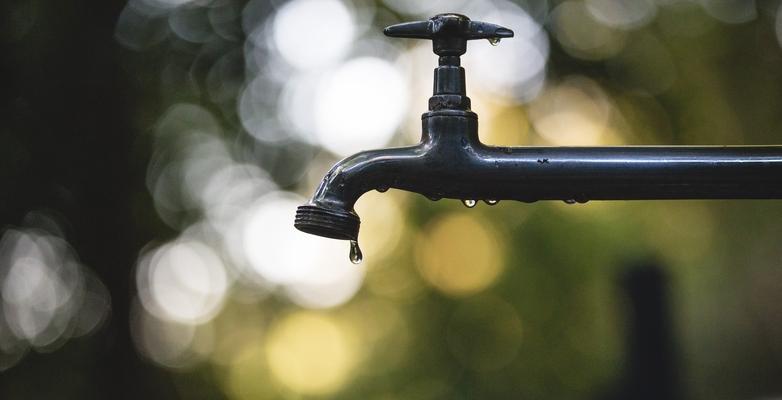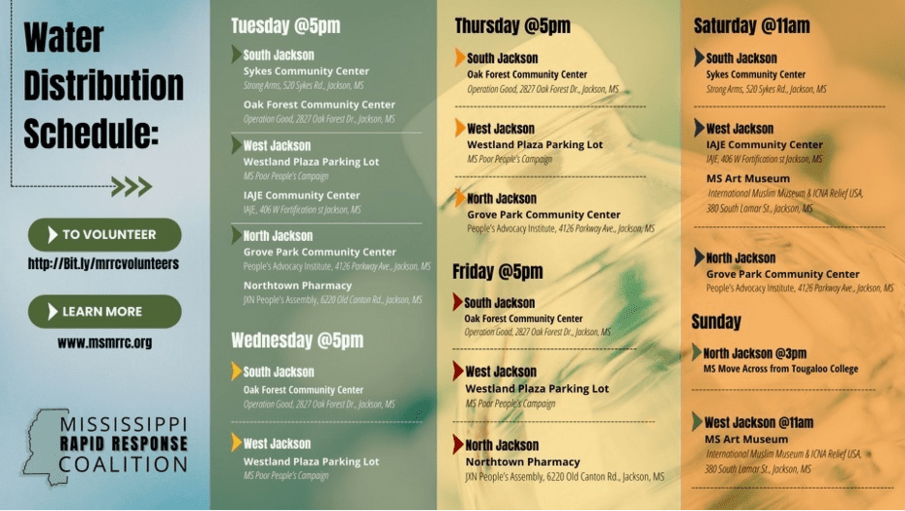
The Water Crisis in Jackson Isn't Over
The crisis in Jackson is re-running the disaster in Flint in many ways – and residents still need our help.
By now, you've probably seen the headlines about the unfolding crisis in Jackson, Mississippi and thought, "That sounds a lot like what happened in Flint several years ago."
And you'd be right.
In a nutshell, historic flooding in August damaged the O.B. Curtis Water Plant, the main treatment facility serving Jackson. Flood waters contaminated the water supply and pressures dropped, leading officials to issue a boil water advisory for the city's nearly 150,000 residents and President Biden to declare an emergency.
Federal and state emergency agencies along with churches and local organizations and volunteers stepped up in the meantime to get bottled water to residents, so people could safely drink, eat, and bathe.
Help support clean and safe water for Jackson
After weeks of repairs to the Curtis Water Plant, on September 15, Mississippi Governor Tate Reeves announced, "We have restored clean water," and the boil water notice was lifted.
For those who don't know the area or the city's history, hearing that announcement could be a reason to think the crisis is over. But that would be wrong.
A History of Neglect
The story of the water crisis isn't about a single storm or flood knocking out a single facility. It's about decades of the state of Mississippi neglecting a city whose population is more than 80% Black to the point that its water system has been failing for years.
For most Americans, it's hard to imagine not being able to trust what comes out of the tap. But as the Washington Post reported, "Even when water is flowing from the taps, residents struggle with intermittent boil-water advisories and high bills for water that is not always safe to drink." Worryingly, city parents now suspect lead exposure for their children.
Given this history and neglect, as Jackson Mayor Chokwe Antar Lumumba told ABC This Week, "Even when we are not under a boil water notice, it’s not a matter of if these systems will fail, but when these systems will fail.” he said.
How did Jackson get here? The answer has to start with race.
In the 1970s, white residents began leaving the city after federal judges mandated integrating public schools. Soon, some middle-class Black families began leaving the city's crumbling schools and roads as well, starting a vicious cycle and leaving a city without the tax base necessary to keep up with infrastructure costs.
Meanwhile, the majority-white state legislature and governor have shot down repeated attempts by the city to find alternate funding streams to pay for system repairs. Now, even with federal money coming in to Mississippi from the recent infrastructure bill, Jackson residents expect the state will keep denying the city its fair share.
But if residents were hoping the city's plight would prompt an about face from the state government, moves by the Mississippi Emergency Management Agency to quickly shut down water distribution sites and comments from the governor mocking the city hardly inspire confidence.
Painful Echoes
For some activists, the echoes to another water crisis are painfully clear. As Krys White, Climate Reality's engagement director and a veteran of the fight for water justice in Flint noted:
"Jackson lifting the boil water advisory, while residents scramble to find resources to bathe, to wash clothes, to cook and feed their children is dangerous. It's the perfect setup for a public health crisis, much like we saw in Flint, MI where lead poisoning and Legionnaires' disease were the harmful results of infrastructure neglect and poor decision making. Mississippi Emergency Management Agency (MEMA) closing water distribution sites in Jackson is cruel in the midst of the O.B. Curtis Water Treatment Plant’s compromised state. Not only are residents suffering from not having clean water to exist, they must now face chemical water poisoning too with a recent chlorine leak. Where does it end?"
For Waikinya Clanton, Mississippi state office director at the Southern Poverty Law Center, the water system breakdown was just another chapter in an ongoing story – and the crisis is far from over.
“Jackson still needs help. What we are experiencing here in Mississippi is literally a tale of two worlds. In a state where nearly 20% of its residents live in poverty, a third of which being children, there is no excuse for the continuous state of neglect people are faced with every day. The collapse of the O.B. Curtis Water Plant in Jackson wasn’t the beginning of the troubles in the capital city, it was only an illumination of the challenges majority Black cities and towns endure every day in the state of Mississippi. Whether it is the misappropriation of funds to support needy families, the denial of basic access to healthcare or the underfunding of schools – poor people in Mississippi are under attack. The reality of many of the cities and towns in Mississippi is a direct reflection of the crippling effect systemic racism has, not just on individuals but communities collectively."
As Clanton explains, what's happening in Jackson highlights the racism and neglect people of color live with all across the state and beyond.
"The crisis in the Magnolia State is a testament of a prolonged legacy of oppression and neglect against Black and brown communities who deserve to thrive here as well. Instead of a shared opportunity at upward mobility, success, and safety; people from marginalized communities are plagued by constant worry which has mainly been predicated by their race. The denial to one’s basic human right of having access to clean, safe water speaks directly to the plight of environmental injustice faced by tens of thousands of Mississippians daily. The recent water crisis in Jackson has opened the door for residents of Mississippi to shine a light on the gross neglect and further injustices that exist all too frequently throughout the state. It is time for those who have been elected to serve the people to become accountable to the people.”
What's Next for Jackson
There is no immediate fix with costs to repair the city's water system for the long haul estimated to reach into the billions. With the state showing no sign of stepping up on its own, the Environmental Protection Agency is stepping in with the aim of reaching a "judicially enforceable agreement" with the city to develop an action plan to ensure residents receive safe water going forward.
If You Can, Contribute to Ensure Safe Water for Jackson
In the meantime, residents have asked for help with bottled water, water filters, and other key support through the Mississippi Rapid Response Coalition.
If you're able, consider a making a contribution here.
Water Distribution in Jackson
If you're a resident of Jackson, the Mississippi Rapid Response Coalition is distributing water at the locations and times below. Note that schedules may evolve, so for the latest, visit www.msrrc.org.

MSRRC is also coordinating contributions of water and supplies. For details, contact Candace Abdul-Tawwab: candace@peoplesadvocacyinstitute.com.
More Water and Resource Distribution Resources
The organizations below are also offering deliveries of water and other assistance for those in need.
Immigrant Alliance for Justice & Equity
406 West Fortification
Jackson MS 39203
Deliveries weekly (Including Saturday and Sunday)
769.251.2380
Water distribution
M-F, 4–6PM
Sat/Sun 10AM–3PM
Volunteer signup
769.251.2380
Mississippi Urban League
For water delivery requests and in-kind water contributions:
Mississippi Urban League
2548 Livingston Road, Suite 1
Jackson, MS 39213
601.987.6783
Contact: angele18@msurbanleague.org
www.msul.org
New Hope Baptist Church
National Baptist Convention USA
NBCUSA Disaster Management
North Jackson (I-220)
1555 Beasley Rd
Jackson, MS 39206
601.366.7002
Contact: Deacon Wheatley
Catholic Charities, Jackson
850 East River Place, Suite 300
Jackson, MS 39202
601.355.8634
Contact: Michael Thomas
Adventist Community Services
EE Rogers SDA school
5125-B Robinson road
Jackson, MS 39204
601.754.9829
Contact: Pastor Edward Harden
Christ Tabernacle Church
1201 Cooper Road
Jackson, MS 39212
601.373.1711/601.502.5196
Contact: Pastor Hosea Hines




